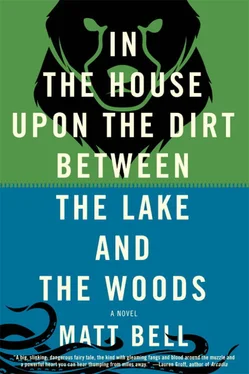The bear’s body tensed beneath her armor, bristled the plates of bones around her head to quivering, and though the fingerling and I joined in her agitation still I did not see what the bear saw.
The memory of our arrival at the foot of the world, at the bottom of everything: To reach the ending of the staircase to find a wall and in that wall a door, inset into the stone.
To climb off the bear, holding the shrouded foundling against one shoulder so that my other hand might be free.
To stand back as the bear threw herself upon the door, knocking her claw-bones against its locked strength.
To let her roar herself empty, then to unfasten the stained join of my shirt, pull free my secret: the key to our house, the key that had forever fit all the doors of my wife’s deep house, whenever I’d found them locked against me.
Then to put my palm against the cold stone of the door.
Then to push it wide and also to step through.
Then at last to understand: It was not a chamber my wife had built at the bottom of the great stairs but a house.
A house, and also a dirt, and also a lake, and also a woods.
5

ADIRT, A WOODS, A LAKE, and all too close together, a miniature landscape surrounding a right-sized house: This was our land as we had first come to it, the place we had arrived newly married, childless but expectant. I had forgotten how bright those days had been, how sweet the air had smelled, but here those memories came rushing back, and even the dirt itself was moist and fragrant, readied for seed. But if the dirt had been made mostly right, still it seemed as if it was subordinate to the house, that shape rebuilt exactly as I remembered, and it seemed that instead of raising the house’s structure upon some preexisting plot, my wife had instead somehow started with its rooms, spinning them out of the black before spilling the lake and the woods and the dirt from within—and even at a glance it seemed obvious she had not finished. Despite the curve of sky above there was hanging upon it no sun and no stars and no moon, and so even the greenness of the trees and the blueness of the lake could not hide that we were at the bottom of a cave, a dome carved from beneath a blanket of blackness. I did not forget then, fought against being fooled, for in that moment I wanted all my senses, knew it was important that I not succumb to this illusion, and so I observed only what original elements I recognized, and also some of their smaller parts: In the window of my wife’s house there flickered the faintness of a gas-lamp, one nearly exhausted of fuel, and I thrilled at the sight, for I believed it meant she lived, that someone still lived inside her house.
The bear bellowed, shoved past me as I stepped farther out onto the dirt, her movements hurried with anger. I let her pass, and with the foundling left behind me in the passageway my hands were freed to drag back my torn and filthy sleeve to reveal my long-stalled watch, that round face, that hovered hand no longer walking its circles. With my other sleeve I scrubbed at its clouded surface, then abandoned my cleaning to wind its stem, and as I did when I tested our family with the fish and the rabbits, I invented my own rules to cause what would happen next—and my new rule said it did not matter what time it was, only that there was again time—and so I wound and I wound, and then I held that mechanism until the bear was halfway between the door and the house, and then with a flinch I let its wheel unwind.
What gasps racked my body then, and also the body of the bear! All that had been slowed now accelerated upon us, old inertias shuddering us forward until the bear’s legs ran too fast, tripping each other, her bone knees smacking against swelled feet. She stumbled and fell forward into the dirt, her head tucked for protection from the crash, her momentum threatening to flip her bulk, but as her shoulders hit the dirt they caught, carved a furrow into the ground, a trench diagonal across the path to the house.
By the time I had gathered the shrouded foundling into my arms and stepped back through the door onto the last dirt, by then the bear was already up again, climbed free and turned back, her bone-limited expression impossible to read at that distance. And then fragments of that bone flying loose as she shook her body, freeing the dirt from her shell. And then snot and spit and bloody worse roping out from her mouth, out of other holes, wounds, opening sores. And then with each step, more dissolution, more disintegration of what shape she had held for so long—and as her body shattered all around her, perhaps she did understand what had happened, or perhaps not.
It did not matter, not then, not to me.
The bear hesitated for some moment, rolled her gaze between me and the still-unopened house, as I stepped forward with my wife’s son held again against me, close in my care. She righted her stance, then proceeded to the house, where with her new paws she battered it as she had thrashed the logs of our first home. Here it seemed the bear held no power over the seams of the house, nor the strength of its walls, and her blows had no effect besides their terrible booming racket, echoed throughout the large chamber. The bear roared, her voice senseless with frustration, even if diminished, and I saw how in her anger she became more an animal, dumber and more dangerous, and while she worked her toothless jaws against my wife’s unencroachable doorjamb I went another way.
Let the bear try for the house, I said. She will gain no entry, and follow us instead.
How sure I meant to speak, but how worried I might have sounded, and more so when I felt the fingerling’s smirking shapes, all moving, all growing faster, radiating from my stomach and everywhere else: He was in my throat and in my spleen, in my liver and in the cork of my bones and flush throughout my head, so that my skull felt too full, so that all my thoughts were pressed in upon. I had not long left before he had the whole of me, but with that time I believed I could at least reach the lake. With every step its water pulled me more, its shimmer tugging at the shape that awaited within or else just outside my shell, an aura ready to be made flesh.
To have my breath stolen away. To stumble, one knee kissing the dirt. To stand and to struggle forward, and then to feel my voice lifted out of my throat and into the air, loud as my dry mouth allowed, and with it came the words the fingerling had waited so long to say, loud betrayals flung back toward the bear, her thrashing at the sound structure of the house:
SAVE ME, the fingerling said. SAVE ME INSTEAD OF YOUR CUB, AND I WILL NEVER LEAVE YOU.
I WILL NEVER DIE, he said. I WILL NEVER AGE.
I AM A CHILD WHO IS A GHOST WHO IS A CANCER AND I AM FOREVER.
I CAN KEEP YOU STRONG, AS I HAVE KEPT THIS WEAKEST MAN, AND TOGETHER WE WILL HAVE ALL THE LAKE AND DIRT AND WOODS WE WANT.
The fingerling said, KILL MY FATHER AND EAT HIS BODY, AND WITHIN HIM, YOU WILL FIND ME WAITING.
The fingerling said, HURRY, FOR HE IS ALMOST INTO THE WATER, and then the bear cracked the air with her anger, turned inside the sound of her voice. She bounded across the dirt, in pursuit of my burdened limping, and while I could have ensured my escape by casting aside the foundling I was unwilling to create an impasse where I held the lake and the bear held the shore—and then in only a few steps I was at the water’s edge—and there the bear struck me just once, a terrible blow landed in haste, at the shallow threshold of the water and the land, the dirt and the lake.
THE BEAR’S FIST OF BONEstruck me from shoulder to hip, through my back, scraped against skin and muscle and organ and rib, and by its force I was dropped into the water, the foundling still held tight against my chest, and as I fell I tucked him within my motion, curled his dead body in the curve of my still living one, and then in the shallows came the shift, the slide sideways into another shape so that I was no longer who I had been, or else I was still him and also something more, and then from behind me came the splashing of the bear following me out into the water, into the waves that spilled up to and then crested over her heavy head.
Читать дальше













